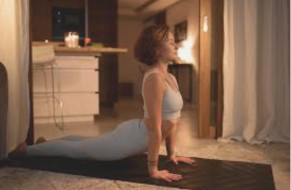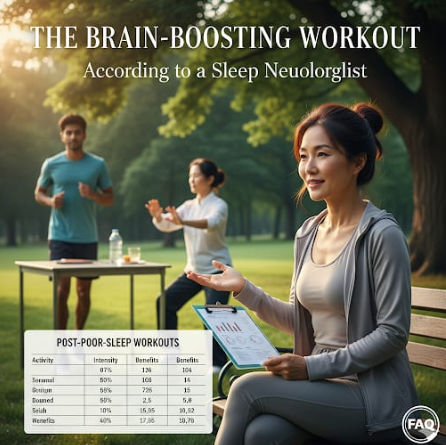How to Exercise Well After a Bad Nights Sleep
The Brain Boosting Workout; How to Exercise Well After a Bad Nights Sleep
We have all been there, staring at the ceiling, counting sheep that refuse to cooperate, and waking up feeling like you have run a marathon before even getting out of bed. A bad night’s sleep can leave you tired, irritable, and with a strong urge to covering yourself in blankets all day.
The last thing on your mind might be exercise. However, according to Dr. Sarah Mednick, a renowned sleep neurologist and author of “Take a Nap! Change Your Life,” strategic movement can actually be your secret weapon to combating the effects of sleep deprivation.
The Sleep Exercise Conundrum; Why Movement Matters and Why It’s Tricky
It is a common misconception that after a poor night’s rest, you should skip your workout entirely. While it is true that pushing yourself to an intense session can be counterproductive and even risky, complete inactivity can worsen the sluggishness and mental fog.
“Our bodies and brains crave movement, even when fatigued,” explains Dr. Mednick. “The trick is to choose the right kind of movement that supports, rather than depletes, your already taxed system.” The goal isn’t to break personal records, but to gently stimulate your cardiovascular system, boost mood-regulating neurotransmitters, and enhance cognitive function.
Understanding the Neurological Impact of Sleep Deprivation, How to Exercise Well After a Bad Nights Sleep
Before diving into the “what,” it’s crucial to understand the “why.” A lack of quality sleep significantly impacts various brain functions. Studies show impaired decision-making, reduced reaction time, difficulty concentrating, and increased emotional reactivity. Your prefrontal cortex, responsible for executive functions, takes a major hit. Furthermore, inflammatory markers can increase, and stress hormones like cortisol can remain elevated. “The right kind of exercise can act as a natural anti-inflammatory, help regulate cortisol, and even promote the production of brain-derived neurotrophic factor (BDNF), which is vital for learning and memory,” Dr. Mednick elaborates. This makes exercise a powerful tool in mitigating the cognitive deficits of sleep loss.
The Gold Standard: Moderate-Intensity Aerobic Exercise
Dr. Mednick unequivocally points to moderate-intensity aerobic exercise as the best workout after a bad night’s sleep. Think sustained, rhythmic movement that elevates your heart rate to about 50-70% of your maximum heart rate. “This type of activity is gentle enough not to overstress your body, yet potent enough to deliver significant cognitive and mood benefits,” she advises. The key is to find that sweet spot where you can still hold a conversation, but you’re definitely breathing harder than usual.
Why Avoid High-Intensity Interval Training (HIIT) and Heavy Lifting?
While HIIT and heavy lifting are excellent for fitness on well-rested days, they can be detrimental when sleep-deprived. “High-intensity workouts place a significant stress load on the body,” says Dr. Mednick. “When your body is already in a state of stress due to lack of sleep, adding more can lead to increased cortisol, impaired recovery, and even heightened risk of injury due to compromised focus and reaction time.” Furthermore, the deep muscle fatigue from these workouts can make you feel even more drained, potentially disrupting subsequent sleep.
The Power of Green Spaces: Outdoor Walks and Gentle Jogs
Combining moderate aerobic activity with exposure to nature amplifies the benefits. “A brisk walk or a gentle jog in a park, along a beach, or even a tree-lined street can be incredibly restorative,” suggests Dr. Mednick. The natural light helps to reset your circadian rhythm, while the fresh air and natural surroundings can reduce stress and improve mood more effectively than an indoor gym session. This outdoor element adds a crucial layer of mental well-being to the physical activity.
Mindful Movement: Yoga and Tai Chi for Serenity
For those who feel particularly drained, or prefer a lower impact option, mindful movement practices like yoga and Tai Chi can be highly beneficial. “While not purely aerobic, these practices combine gentle physical activity with breathwork and mindfulness, which are excellent for calming the nervous system and improving focus,” explains Dr. Mednick. The slow, controlled movements can enhance flexibility, reduce muscle tension, and provide a mental escape from the fogginess of sleep deprivation, preparing your body for better sleep later.
Timing is Everything: When to Exercise
The timing of your workout also plays a crucial role. “Aim for early to mid-morning, or early afternoon,” Dr. Mednick recommends. “Exercising too close to bedtime, especially with any significant intensity, can raise your core body temperature and stimulate your nervous system, making it harder to fall asleep.” Leaving at least 3-4 hours between your workout and bedtime is a good rule of thumb to allow your body to cool down and your mind to wind down.
Hydration and Nutrition: Fueling Your Sleep-Deprived Body
Beyond the workout itself, proper hydration and nutrition are paramount. “Even mild dehydration can exacerbate fatigue and cognitive impairment,” Dr. Mednick warns. Ensure you’re drinking plenty of water throughout the day. Opt for nutrient-dense foods that provide sustained energy, like complex carbohydrates, lean proteins, and healthy fats. Avoid sugary snacks and excessive caffeine, which can lead to energy crashes and further disrupt sleep patterns.
Listening to Your Body: The Ultimate Guide,
Ultimately, the best workout is the one your body allows you to do without feeling worse. “On a day after poor sleep, listen intently to your body’s signals,” advises Dr. Mednick. “If a brisk walk feels like too much, opt for gentle stretching or some light yoga. The goal is to feel better, not to push yourself to exhaustion.” Be flexible, be kind to yourself, and remember that consistency in gentle movement is more beneficial than sporadic, intense bursts when your system is compromised, How to Exercise Well After a Bad Night’s Sleep.
Here is the Recommended Workout After a Bad Night’s Sleep
| Activity | Intensity | Duration | Benefits |
|---|---|---|---|
| Brisk Walking | Moderate / Realistic | 20 to 45 Minutes | Boosts, mood, improves circulation gentle on joints can be done outdoors for added benefits of natural light and fresh air. |
| Light Jogging | Moderate / Realistic | 20 to 30 Minutes | Increases heart rate effectively enhances cardiovascular health releases endorphins, can be mentally clearing. |
| Cycling (Stationary – Outdoors) | Moderate / Realistic | 30 to 45 Minutes | Low impact, good for sustained cardio, allows for varied intensity without high impact can be mentally engaging. |
| Swimming | Moderate / Realistic | 30 to 45 Minutes | Full body workout, very low impact, soothing and refreshing helps calm the nervous system excellent for overall endurance. |
| Gentle Yoga | Low Moderate | 30 to 60 Minutes | Improves flexibility balance and focus reduces stress promotes relaxation, mindful movement can aid in mental clarity and prepare for better sleep. |
Frequently Asked Questions (FAQs)
Q1: Should I just nap instead of working out after a bad night’s sleep?
A1: While a short power nap (20-30 minutes) can be beneficial, it shouldn’t replace all activity. A strategic workout can improve energy and mood, making a nap more effective if you choose to have one later.
Q2: Will coffee help me power through a workout after poor sleep?
A2: A moderate amount of coffee might give a temporary boost, but relying heavily on it can lead to crashes and further disrupt your sleep cycle. Focus on hydration and the right kind of movement instead.
Q3: What if I feel too tired to do even a moderate workout?
A3: Listen to your body. On such days, opt for very gentle stretching, a short walk around the block, or even just some deep breathing exercises. Any movement is better than none, but never push yourself to discomfort.
Q4: Can exercise actually make my sleep worse if I’m already tired?
A4: If you engage in high-intensity exercise too close to bedtime, yes. However, moderate exercise earlier in the day can actually improve sleep quality by reducing stress and helping to regulate your circadian rhythm.
Q5: How long should I wait after waking up before exercising?
A5: It’s often beneficial to get some light movement in within a few hours of waking. This can help kickstart your metabolism and boost alertness. However, there’s no strict rule, just avoid intense exercise too close to bedtime.











